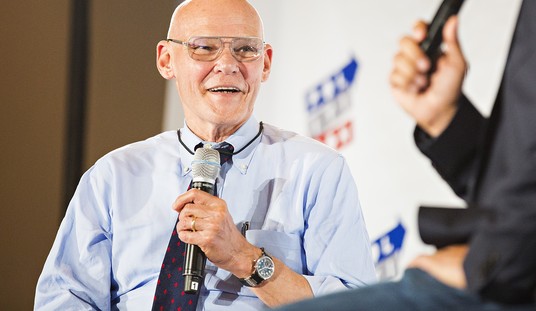Illegal Immigration, Race, and Chauvinism
There is nothing about illegal immigration that should ipso facto involve matters of race, culture or ethnicity, given that it is a legal issue at heart. I think the great majority of opponents of open borders would be equally worried should 12 million illegal immigrants come here from a now bankrupt Ireland, Greece, or Portugal. That an illegal alien from a European country would claim my allegiance or empathy on the basis of ethnic solidarity would have zero currency.
So for most of us, the question is primarily a legal one — if federal statutes are not followed, what sanctity is left in the law itself? I am reminded of that classic exchange between Crito and Socrates, when the former urges the latter to break out of jail, disobey the law and its death sentence, and ignore what they both feel was an unfair verdict. Socrates, inter alia, reminds Crito that the individual cannot pick and choose his own level of compliance with those statutes he finds distasteful or inconvenient.
That is not to say that race hasn’t become inevitably intertwined throughout the discussion. Ruben Navarrette, Jr., on these PJM pages, cited some distasteful animal metaphors used in the context of illegal immigration by a number of officials and would-be officials that clearly cross the line of common decency. These, I think, are not the norm, but Navarrette is right nevertheless they must be condemned as reckless and thinly veiled racist speech.
By the same token, however, much of the amnesty movement itself resorts to tribal chauvinism and has turned the issue of sovereignty and illegality into an implied threat: either grant the DREAM Act or face the consequences of bloc voting in the future — as if all Latinos will think and act similarly, and one issue will adjudicate a voter’s electoral menu.
Note for example a recent essay on the eve of the DREAM Act by Rep. Luis Gutierrez:
A million more eligible young Latino voters will be in play by the time votes are cast in 2012. In every state of the union, they are becoming the newest voting constituents of every Senator and Congressman. Do you think they will forget who voted for and against the DREAM Act in two years? What about the two million newly eligible voters in four years? Believe me when I tell you they will remember who fought for — and against — deporting their sisters, cousins, best friends, boyfriends, and teammates. … This generation of immigrants — like every generation before them in U.S. history — will become citizens and voters eventually. In the meantime, their neighbors, friends, and families are already citizens and voters and more are reaching voting age each day. They are writing down their naughty and nice lists this Christmas in pen, not pencil, and will remember what you give them this Christmas for a very, very long time.
Follow the disturbing logic that ignores principle and focuses on raw self-interest: either grant amnesty on my terms to some of those who are here illegally or we are going to punish you as enemies (perhaps channeling the president’s own election-eve characterization) at the polls.
Note also the unfortunate ethnic appeal of Gutierrez: he does not argue for the bill on the merits that pertain to all illegal aliens per se (e.g., whether Chinese or Somali) but instead on the basis of racial affinities, as in “young Latinos” and their “sisters, cousins, best friends, boyfriends, and teammates.”
One wonders, would Rep. Gutierrez be so animated an advocate for DREAM-Act amnesty should the matter had involved, say, hundreds of thousands of Asian illegal aliens? And if not, why not? And are we to believe all Latino-American youth must naturally put aside concerns about the law and make those worries secondary to ethnic solidarity? Do we really wish each constituency in America to see shared problems in terms of our own ethnic “sisters, cousins, best friends, boyfriends and teammates” — or, in the recent racist appeals of a Rep. Loretta Sanchez, to vote according to ethnic heritages?
Finally, Gutierrez offers a disturbing racialist snide remark with: “I see a delightful — and at times challenging — spark of hope in the spirit of the young people fighting for this bill, whether it would help them directly or not. It is a remarkable counter-example to the stereotype of Facebook and Game Boy addicted youth who are thought to be apathetic about their nation, her laws, and society at large.”
I think Gutierrez’s implication is that those Latinos who are fighting for DREAM Act amnesty are in marked contrast with the rest of American youth (mostly non-Hispanic?) that in his view are apathetically addicted to Facebook and Game Boy and thus lack Gutierrez’s admirable notion of ethnic solidarity. But then note how Orwellian his rant becomes: he characterizes those youth not supporting veritable disobedience to federal law as “apathetic … about her laws.” In contrast, does not residing for years as an illegal alien constitute being “apathetic” about America’s “laws”?
Most illegal aliens simply left Mexico for a better life in the United States, mostly on word of mouth that there was very little enforcement of immigration law, work was plentiful, and prospects were far brighter than in Mexico. Most do not wish to go back to Mexico, understanding that while Mexico is a naturally rich country, it operates on political and economic principles that do not ensure wealth, security, and dignity for its own, at least in the manner of the United States.
Unfortunately a shrill elite finds, as Rep. Gutierrez implied, political capital in framing legal issues in terms of race and ethnic solidarity. In that context, they are the mirror image of those who in thinly veiled racial terms demonize illegal aliens.
One, for example, can still go onto a MEChA website and find separatist racial chauvinism. If most of the sites have been scrubbed of the old nonsense about a brown state for a brown people and “everything for the race” nonsense, enough remains to disturb:
- MEChA must bring to the mind of every young Chicana and Chicano that the liberation of her/his people from prejudice and oppression is in her/his hands and this responsibility is greater than personal achievement and more meaningful than degrees, especially if they are earned at the expense of her/his identity and cultural integrity. MEChA, then, is more than a name; it is a spirit of unity, of sisterhood and brotherhood, and a resolve to undertake a struggle for liberation in society where justice is but a word. MEChA is a means to an end …
- The Mexican-American (Hispanic) is a person who lacks respect for his/her cultural and ethnic heritage. Unsure of her/himself, she/he seeks assimilation as a way out of her/his “degraded” social status. Consequently, she/he remains politically ineffective. In contrast, Chicanos reflects self-respect and pride on one’s ethnic and cultural background. Thus, the Chicana/o acts with confidence and with a range of alternatives in the political world. She/he is capable of developing an effective ideology through action.
This message of “cultural integrity” and opposition to assimilation is not just rehashed sixties braggadocio, but again jumps out on the opening pages of such websites. It gets much worse from the racist La Voz of Aztlan, an extremist and marginal publication where one can read of real hatred and talk of “gringo dollars” — in addition to the most overt anti-Semitism imaginable, on par with the Klan’s anti-Jewish diatribes.
Even some mainstream Latino groups for some reason still cling to racialist terminology, as in the National Council of La Raza. In another Orwellian example, it arbitrarily has announced that raza simply does not mean what raza means (e.g., race, from Latin radix). But no one would find that assertion believable anywhere in the Spanish speaking world.
The Concise Oxford dictionary of Spanish rightly defines raza as “race,” and if one were to translate extremist English phraseology into Spanish (e.g., “master race” [raza superior], “white race” [raza blanca]), raza would be the natural vocabulary. In short, La Raza surely understands the racial connotations of raza, and that they would be lost with more neutral words such as gente or pueblo that far better convey the idea of community or people. That it tries to preempt proper criticism of its usage by declaring raza does not mean race does not make it true
Ad hominem character assassination
This exchange was aired on Joe Scarborough’s show recently (Scarborough, remember, is an advocate of the No Labels movement that pledges not to engage in name calling):
JOE SCARBOROUGH: I’m trying to figure out though, and Dr. Sachs asked this of you Charles [Blow], who is Barack Obama at this point? What does he stand for? And Victor Davis Hanson, at the National Review, writes this about The Obamaites About-Face:
“For his political survival, Obama now accepts that his faith-based ideas about the environment, radical Islam, taxes, stimulus, the economy, national security, and foreign policy are not supported by any evidence in the real world . . . The wonder is not that politicians change as politics dictate, but that the most vehement leftism now accepts nonchalantly what it not long ago so ardently demonized.”
And Hanson goes through all of the things: the Bush tax cuts, the estate tax cuts, the stimulative wonders of tax cuts in general, Gitmo, NSA, tripling the number of troops in Afghanistan. We talked about [Obama saying] “we celebrate wealth,” Eric Holder quoted in ABC saying “some religions produce more terrorists than others.” These people are sounding an awful lot like George W. Bush these days . . . [Obama] has shifted dramatically on issues of terror, on Gitmo, on taxes, on celebrating wealth: I think that’s undeniable.
JEFFREY SACHS: Anything that Hanson says I’m likely to disagree with, cause no commentator has done more harm to the American people actually than that guy who led us into all these disastrous wars. But aside from that —
SCARBOROUGH: My God! That is serious.
MIKA BRZEZINSKI: OK, then!
SACHS: No, that is real. Because this is an extremist. So quoting him doesn’t really make the point
SCARBOROUGH: And I will put Victor Hanson —
SACHS: Sorry, that’s a side point, but that man — that guy’s done a lot of damage.
SCARBOROUGH: I will put Victor Davis Hanson to the side, you obviously, you guys aren’t on each other’s mailing lists, Christmas card lists.
SACHS: That guy got us into more wars, and more militarism, than anybody.
Note some things about Sachs’ classic demagoguery:
1) Sachs simply does not refute my quoted statement that after attacking those who supported the anti-terrorism protocols of the last decade, Obama has embraced all of them, from Guantanamo to tribunals and Predators, and the same about-face now holds true on a variety of issues from the Bush tax rates to the dangers of radical Islam.
Instead, Sachs’ answer to all that is reduced to an incoherently worded, “Anything that Hanson says I’m likely to disagree with, cause no commentator has done more harm to the American people actually than that guy who led us into all these disastrous wars.”
I suppose the qualifier “anything” excuses him from having to offer a rebuttal, which Sachs is apparently unwilling or unable to produce.
2. After calling me an “extremist” and claiming I do more harm than any other commentator, he lists as evidence of that charge that I have “led us into all these disastrous wars.” Not Bush, not Bill Clinton in the Balkans, not the Senate and House that voted for both the Afghanistan and Iraq wars, but I have “led” us. That is as pathetic a charge as it is adolescent.
3. As far as “all these disastrous wars”: There have been three recent wars. A) I supported Bill Clinton’s removal of Milosevic; the world is better off without his bloodletting. B) I supported the removal of Saddam Hussein, the surge, and the fostering of the present government. The recent constitutional agreements in Baghdad and the relative calm, in the latest words of the Washington Post, seem to support the vision of Bush’ s original intent of a consensual government. The world is again better off without a mass murdering Saddam, and millions have had a chance of some sort of normalcy which was impossible under Saddam. History will sort out the final verdict on the terrible costs versus the clear benefits; the brilliant record of brave American soldiers, however, is already enshrined. I note as well that Obama, after running on the premise of wanting troops out by March 2008, for some reason has accepted the Bush-Petraeus plan of stabilization and withdrawal without exception. Joe Biden, remember, claimed that Iraq could be Obama’s “greatest achievement.”
4. I supported the 2001 removal of the Taliban. For all the recent setbacks in Afghanistan, I remain confident that we can stabilize the region and leave something better than the Taliban and its al-Qaeda guests.
I don’t think much of “anything” that Sachs has written about his theories of foreign assistance partnerships with the UN or the supposedly proper methodology of U.S. foreign aid in alleviating poverty is very convincing. And I think the record would support that bleak assessment of Sachs’ ideas; in all his various and shifting incarnations — from the erstwhile shock therapy plans for the former communist bloc to the UN/big donor foreign aid ideas — a common theme has been chaos.
But I certainly don’t think being wrong or causing harm was his intent. And I wouldn’t suggest that he is an “extremist,” and I would debate, not demonize, him — even if he has a bad habit of demagoguery, as his latest puerile outburst once again demonstrates.









Join the conversation as a VIP Member